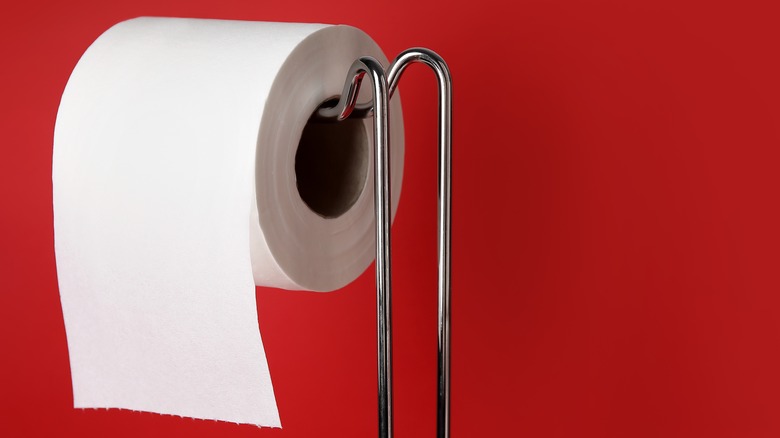What To Do If You Find Blood In Your Stool
Finding blood in your stool is enough to give anyone a jolt, but that doesn't mean you should automatically think the worst. There are several different conditions that can lead to bloody stool, and it may not be cause for alarm.
Blood in or on stool is caused by bleeding somewhere in the gastrointestinal (GI) tract, the system that starts with the mouth and ends with the anus. It is responsible for food intake, digestion, and the elimination of waste (via Verywell Health). The color of the blood can give an indication of where the bleeding is coming from.
Bright red or maroon-colored blood is most likely coming from the colon. According to Mindbodygreen, since the colon is close to the anus, the blood is "fresh" and therefore keeps its bright red color. Hemorrhoids, which are swollen blood vessels around the anus, are a common cause of bloody stool. They're caused by increased pressure on the rectum, often as a result of constipation, pregnancy, or obesity. Straining while sitting on the toilet trying to poop can also contribute to the problem.
Blood in stool can have a number of different causes
"The longer you spend straining to evacuate your bowels, you could be making hemorrhoids worse," Dr. Rashmi Kumar, a gastroenterologist at the Banner – University Medicine Digestive Institute, told Women's Health. Anal fissures, which are tears in the moist, thin lining of the anus called the mucosa, can also cause bloody stool.
Diverticulitis, a condition in which small pouches form on the walls of the colon and become infected or inflamed, can cause bleeding. In rare cases, inflammatory bowel diseases (IBD) like Crohn's disease and colitis can result in bleeding as well (via Mindbodygreen).
In some cases, polyps — or masses of cells that can form in the colon — can become cancerous and result in bloody stool. That's why experts strongly recommend colonoscopies, which can spot polyps before they turn cancerous. "I cannot emphasize enough how important it is to get screening by colonoscopy at the age of 50, and 45 for African Americans," Dr. Kumar told Women's Health.
Finding blood in your stool could just mean that you need to increase your fiber intake and drink more water. Blood-colored stool can even be the result of eating certain foods, like beets or food dyes, but it's impossible to know for sure. Talk to your doctor as soon as you notice this symptom.


